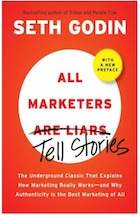
RATING: 9/10
My favorite Seth Godin book. I feel this is his magnum opus on marketing. Perhaps his most misunderstood book (originally titled “All Marketers are Liars), It breaks down the importance of creating a story around what you sell, whether that be a product, service, or yourself. Like most of Godin’s books, it’s a quick read. If you’re a fan of Seth, but have not checked this out, you are in for a treat.
You must choose a position: If their fast, we’re slow; If their cheap, we’re expensive.
Don’t try to change someone’s worldview is the strategy smart marketers follow
Don’t try to use facts to prove your case and to insist that people change their biases. You don’t have enough time and you don’t have enough money. Instead identify a population with a certain worldview, frame your story in terms of that worldview and you win.
Your opportunity lies in finding a neglected worldview, framing your story in a way that this audience will focus on and going from there.
A worldview is not forever. It’s what the consumer believes right now.
It’s not enough to find a niche that shares a worldview. That niche has to be ready and able to influence a large group of friends.
Growth starts with better questions, questions about storytelling…not about commodities.
Fuck logic —play to emotions
You cannot prove your way into a sale — you gain a customer when the customer proves to herself that you’re a good choice.
The process of discovery is more powerful than being told the right answer because of course there is no right answer, and because even if there was, the consumer wouldn’t believe you!
A story that works combined with authenticity and minimized side effects builds a brand (and a business) for the ages.
The ethical test for marketing:
-If I knew what you know, would I chose to buy what you sell? And
-After I’ve used this and experienced it, will I be glad I believed your story or will I feel ripped off?
Belief in the lie must not ultimately harm the consumer because if it down, you’ll run out of consumers and credibility far too soon.
Telling people that they believed a lie for a long time is no way to make friends. If it’s a good lie, a lie that led people to enjoy themselves or to be productive, then taking that lie is actually hurtful. (Its like telling someone straight up their wrong).
Before telling someone else a story, tell the story to yourself
The best place to start? Copy someone in a different industry who’s telling a similar story. Discover the cues and signals she uses. Do them all, not just a few. Your story is a symphony, not a note.
The best place to start with your product, your service, your organization and your resume is this: what classic story can I tell?
You cannot succeed if you try to tell your competitors story better than they can.
Instead you must tell a different story and persuade those listening that your story is more important than the story they currently believe.
If your competition is faster, you must be cheaper.
If they sell the story of health, you must tell the story of convenience
The best alternative strategy is to find a different community with a different worldview that wants to hear a different story.
Addressing the community of your dominant competitor is going to fail.
The only stories that work, the only stories with impact, the only stories that spread are the “I can’t believe that!” stories. These are the stories that aren’t just repeatable: these are the stories that demand to be respected.
You succeed by being an extremist in your storytelling, then gracefully moving your product or service to the middle so it becomes more palatable to audiences that are persuaded by their friends, not by you.
Your goal should not (must not) be to create a story that is quick, involves no risk and is without controversy. Boredom will not help your story.
